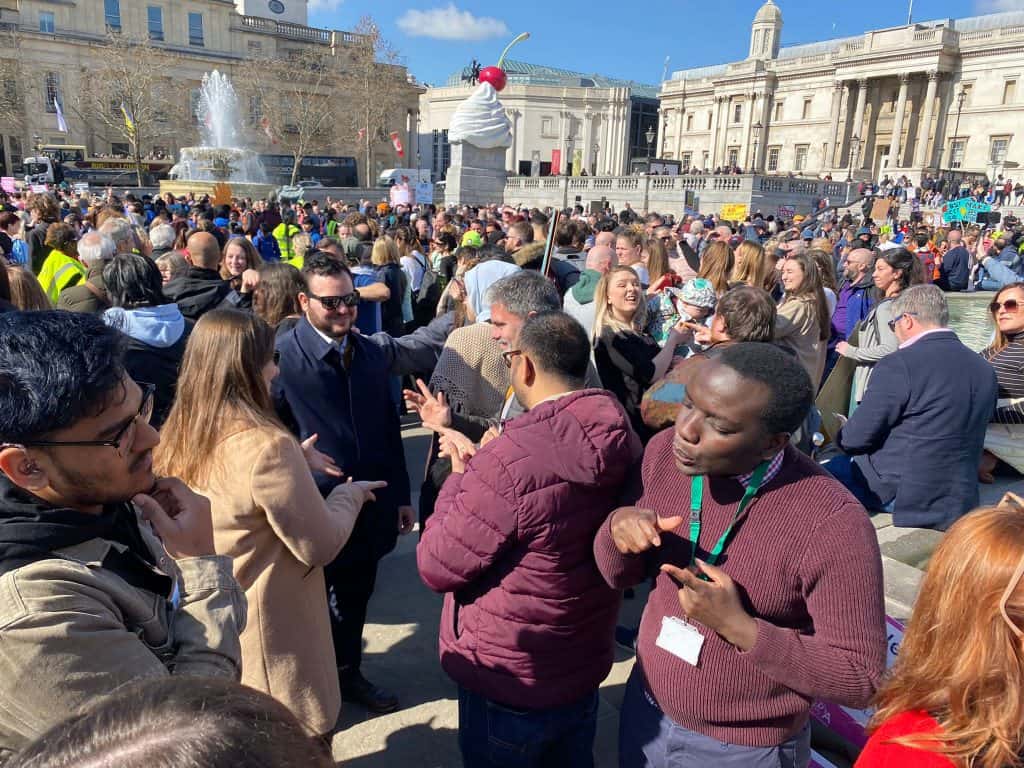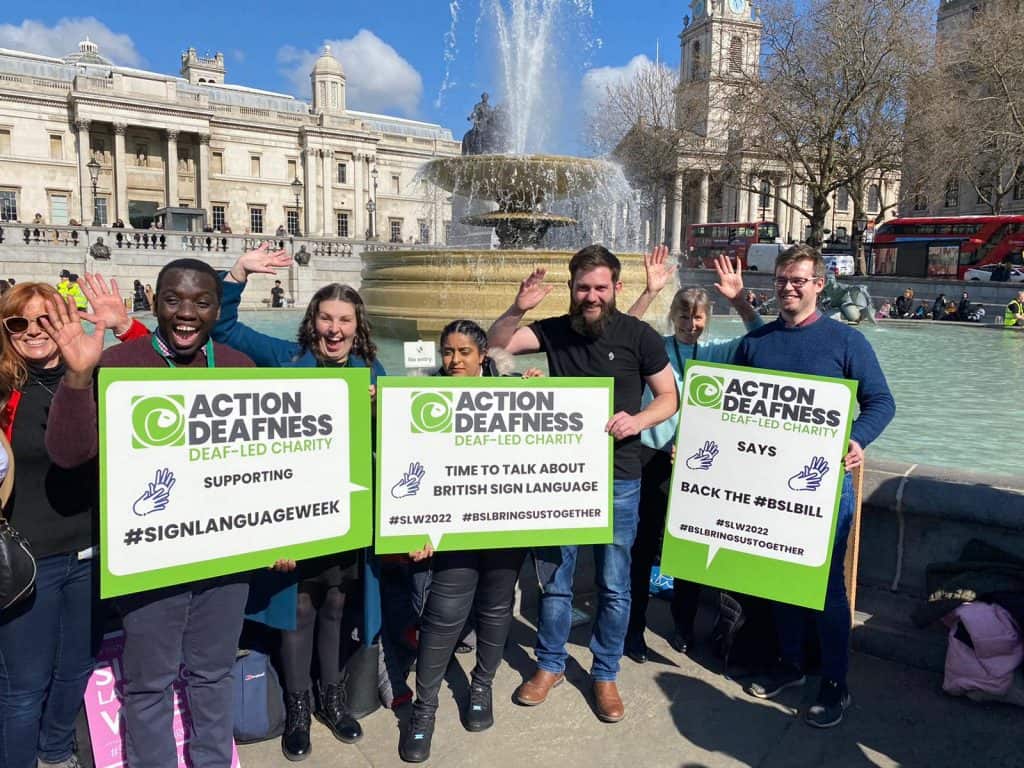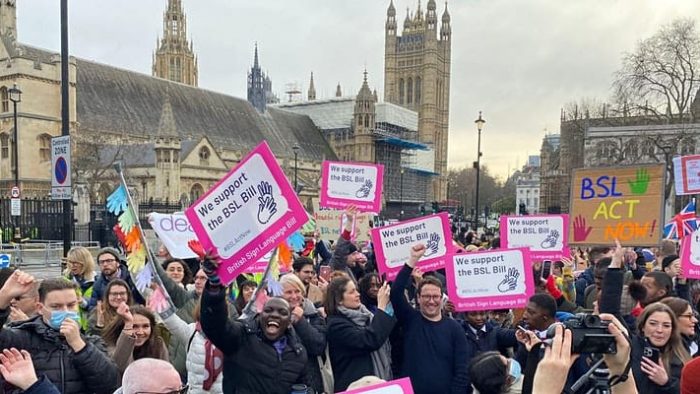On Friday 18th March, during Sign Language Week, the deaf community came together in Trafalgar Square to get behind the third reading of the British Sign Language Bill, debated in the House of Commons. Hundreds of people flooded the London landmark to show their support, united in backing the Bill that will hopefully be enshrined in UK law.
Rosie Cooper MP has strongly advocated for the Bill being passed and getting it to the House of Lords, where it currently sits. The third reading was unanimously passed in the Commons and even passed its first reading in the House of Lords on Tuesday 22nd March.
The Bill is now awaiting its second reading in the House of Lords, which happens today. So what is the process for Parliamentary Bills, such as the BSL Bill, becoming law.
House of Commons First Reading
The short title of the Bill is read out and is followed by an order for the Bill to be printed.
After the reading, the Bill is published as a House of Commons paper for the first time.
The next stage is second reading, the first opportunity for MPs to debate the general principles and themes of the Bill.
Second Reading
The Government minister, spokesperson or MP responsible for the Bill opens the second reading debate.The official Opposition spokesperson responds with their views on the Bill. The debate continues with other Opposition parties and backbench MPs giving their opinions.
At the end of the debate, the Commons decides whether the Bill should be given its second reading by voting, meaning it can proceed to the next stage. Once second reading is complete the Bill proceeds to committee stage – where each clause (part) and any amendments (proposals for change) to the Bill may be debated.
Third Reading
Third reading is the final chance for the Commons to debate the contents of a Bill. It usually takes place immediately after report stage as the next item of business on the same day. Amendments (proposals for change) cannot be made to a Bill at third reading in the Commons.
At the end of the debate, the House decides (votes on) whether to approve the third reading of the Bill.

House of Lords First Reading
First reading is the first stage of a bill’s passage through the House of Lords – usually a formality, it takes place without debate. First reading of a bill can take place at any time in a parliamentary session. The long title (indicating the content of the bill) is read out by the member of the Lords in charge of the bill. Once formally introduced, the bill is printed.
The next stage is second reading – the first opportunity for members of the Lords to debate the main principles and purpose of the bill.
Second Reading
The government minister, spokesperson or a member of the Lords responsible for the bill opens the second reading debate. Any member can speak during second reading – this stage can indicate those members particularly interested in a bill, or a specific aspect of it, and those who are most likely to be involved in suggesting changes at later stages.
Second reading debates usually last for a few hours but can sometimes stretch over a couple of days. After second reading the bill goes to committee stage – where detailed line by line examination and discussion of amendments takes place.
Committee Stage
During committee stage every clause of the bill has to be agreed to and votes on any amendments can take place. All suggested amendments have to be considered, if a member wishes, and members can discuss an issue for as long as they want. The government cannot restrict the subjects under discussion or impose a time limit. This is a key point of difference with procedure in the House of Commons.
If the bill has been amended it is reprinted with all the agreed amendments. At the end of committee stage, the bill moves to report stage for further scrutiny.
Report Stage
During report stage detailed examination of the bill continues. Any member of the Lords can take part and votes on any amendments may take place.
After report stage, the bill is reprinted to include all the agreed amendments. The bill then moves to third reading, a further chance for the Lords to discuss and amend the bill as it nears conclusion.
Third Reading
Amendments at third reading are often used to clarify specific parts of the bill and to allow the government to make good any promises of changes they made at earlier stages of the passage of a bill.
If the bill began in the Commons, it is sent back after third reading in the Lords for consideration of Lords amendments, or, if there have been no amendments in the Lords, is sent to the monarch for royal assent.
Royal Assent
When a Bill has completed all its parliamentary stages in both Houses, it must have Royal Assent before it can become an Act of Parliament (law). Royal Assent is the Monarch’s agreement to make the Bill into an Act and is a formality.
There is no set time period between the consideration of amendments to the Bill and Royal Assent – it can even be a matter of minutes after Ping Pong is complete.
When Royal Assent has been given to a Bill, the announcement is usually made in both Houses – at a suitable break in each House’s proceedings – by the Lord Speaker in the Lords and the Speaker in the Commons.
At prorogation (the formal end to a parliamentary year), Black Rod interrupts the proceedings of the Commons and summons MPs to the Lords Chamber to hear the Lords Commissioners announce Royal Assent for each Bill.
After Royal Assent, the legislation within the Bill may commence immediately, after a set period or only after a commencement order by a Government minister. A commencement order is designed to bring into force the whole or part of an Act of Parliament at a date later than the date of the Royal Assent. If there is no commencement order, the Act will come into force from midnight at the start of the day of the Royal Assent.
The practical implementation of an Act is the responsibility of the appropriate government department, not Parliament.


